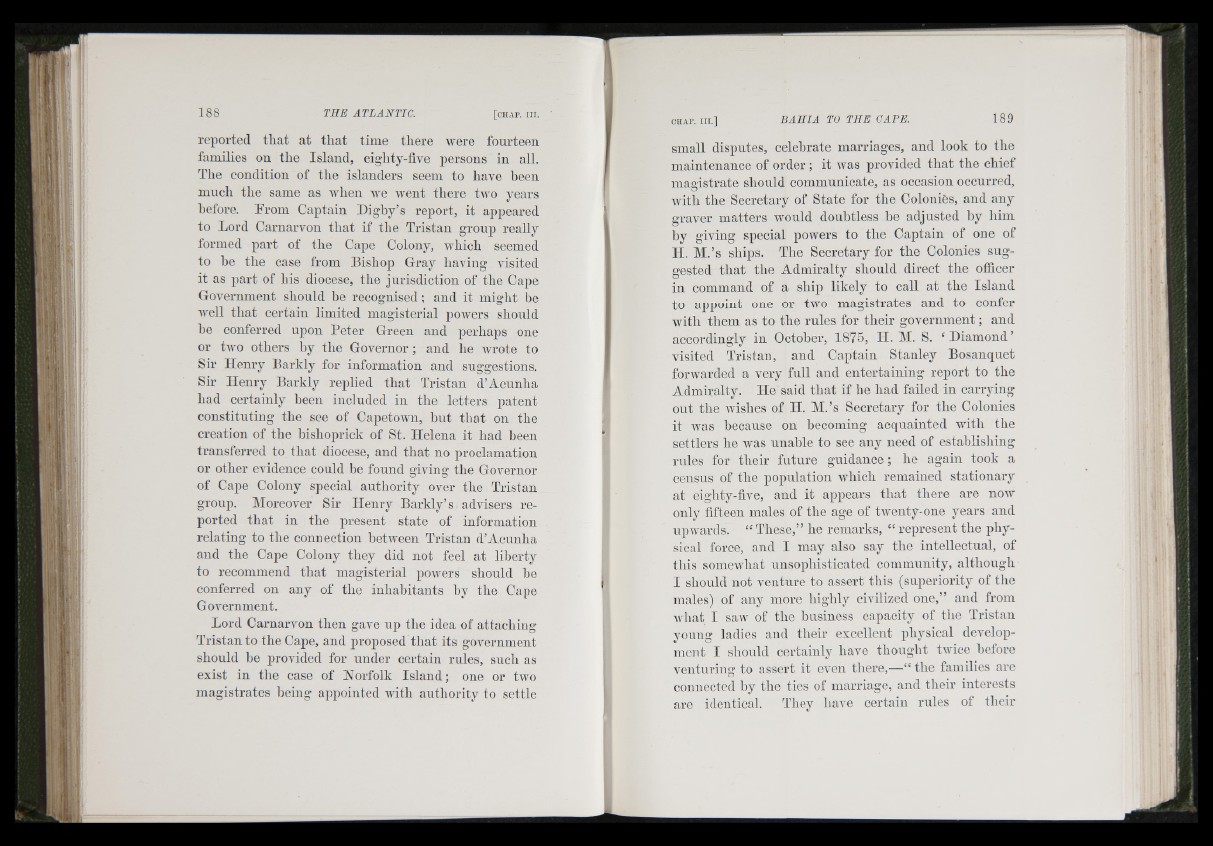
reiAorted that at that time there were fourteen
families on the Island, eighty-iiA'e persons in all.
The condition of the islanders seem to have been
mnch the same as Avhen Ave Avent there tAvo years
hefore. From Captain Dighy’s report, it appeared
to Lord Carnarvon that if the Tristan group really
formed part of the Cape Colony, wliich seemed
to be the case from Bishop Gray having visited
it as part of bis diocese, the jurisdiction of the Cape
Government should be recognised; and it might be
well that certain limited magisterial jiOAvers should
be conferred upon Peter Green and perhaps one
or tAvo others by the Governor ; and be Avrote to
Sir Henry Barkly for information and suggestions.
Sir Henry Barkly replied that Tristan d’Acunlia
bad certainly been included in the letters patent
constituting the see of CapetoAvn, hut that on tbe
creation of the bislioprick of St. Helena it had been
transferred to that diocese, and that no proclamation
or other evidence could be found giving the Governor
of Cape Colony special authority over the Tristan
group. Moreover Sir Henry Barkly’s advisers reported
that in the present state of information
relating to the connection betw'een Tristan d’Acunlia
and the Cape Colony they did not feel at liberty
to recommend that magisterial poAvers slionld be
conferred on any of the inhabitants by the Cafie
G OA'ernment.
Lord Carnarvon then gave up the idea of attaching
Tristan to the Cape, and proposed that its government
should be provided for under certain rules, such as
exist in the case of Norfolk Island; one or two
magistrates being appointed with authority to settle
small disputes, celebrate marriages, and look to tbe
maintenance of order; it Avas provided that tbe chief
magistrate should communicate, as occasion occurred,
Avith the Secretary of State for the Colonies, and any
graver matters Avould doubtless be adjusted hy him
by giving special powers to the Captain of one of
II. M.’s ships. The Secretary for the Colonies suggested
that the Admiralty should direct the officer
in command of a ship likely to call at the Island
to appoint one or tAvo magistrates and to confer
with them as to the rules for their government; and
accordingly in October, 1875, II. M. S. ‘ Diamond’
visited Tristan, and Captain Stanley Bosanquet
forwarded a very full and entertaining report to the
Admiralty. He said that if be bad failed in carrying
ont the Avishes of II. M.’s Secretary for the Colonies
it Avas because on becoming acquainted with tbe
settlers he Avas unable to see any need of establishing
rules for their future guidance; he again took a
census of the population Avhich remained stationary
at eighty-five, and it appears that there are u o a v
only fifteen males of the age of tAventy-one years and
upwards. “ These,” he remarks, “ represent the physical
force, and I may also say the intellectual, of
this someAvhat unsoiAhisticated community, although
I should not venture to assert this (superiority of the
males) of any more highly civilized one,” and from
Avbat I saAV of the business capacity of the Tristan
young ladies and their excellent physical dcA'elop-
mont I should certainly have thought tAvice hefore
venturing to assert it CA'cn there,—“ the families are
connected hy the ties of marriage, and their interests
are identical. They have certain rules of their